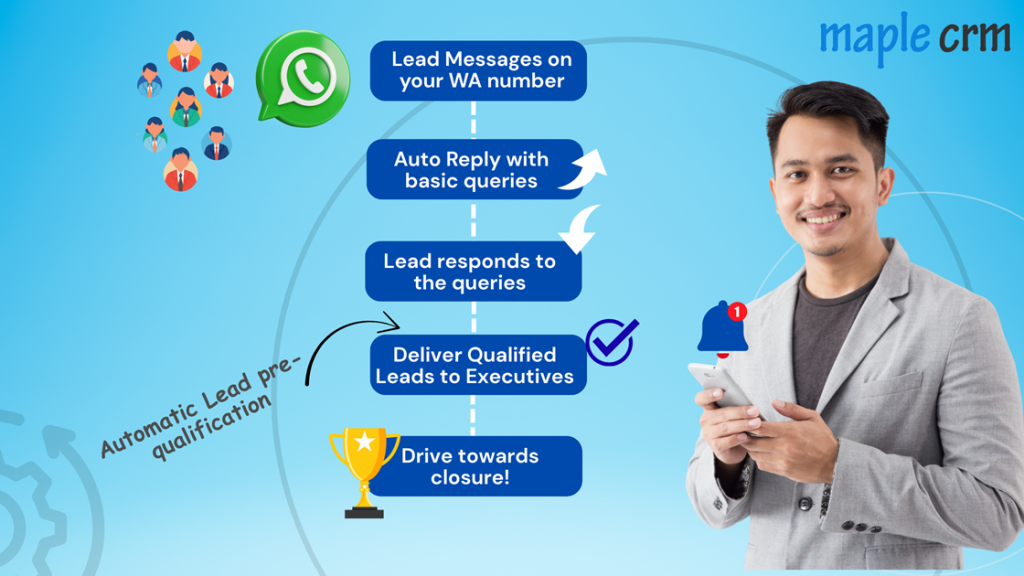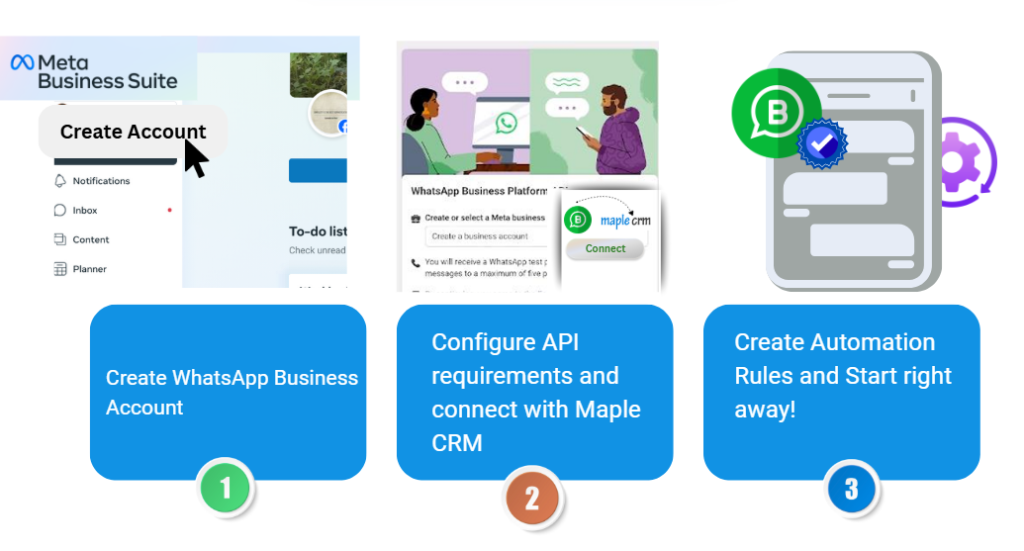🕖 3 min read | www.maplecrm.com

Did you know, that more than 1.5 billion global consumers and businesses use WhatsApp Business and multiple integrations with the API. What does this prove?
It proves that WhatsApp business is one of the the most sought after channels for communication, business and prospecting among businesses worldwide.
And why wouldn’t it be, when it eases the way we do business, it quickens the pace of communication and – most important of all- phone is always handy, and WhatsApp is just- there!
Here are 5 major benefits of using WhatsApp Business API in businesses:
- Seamless Customer Communication
- Enables businesses to interact with customers on the platform they already use daily.
- Real-time messaging ensures quick query resolution and higher engagement.
- Automation & Scalability
- Supports chatbots and automation for FAQs, order updates, and customer support.
- Helps businesses manage large-scale conversations without overloading human agents.
- Enhanced Customer Experience
- Personalized, two-way communication builds stronger customer relationships.
- Features like rich media (images, PDFs, locations, etc.) improve clarity and support.
- High Security & Trust
- End-to-end encryption ensures customer data privacy.
- Verified business accounts add credibility and increase customer trust.
- Integration with CRM & Business Tools
- Can be integrated with CRM systems, payment gateways, and customer support tools.
- Provides a centralized view of customer interactions, helping improve sales and service.

WHY do you need a WhatsApp Business Integration with your CRM?
- Unification
- Streamlining
- Automation
A WhatsApp Business integration with your CRM ensures all customer conversations flow directly into your central system, eliminating scattered communication across different platforms. (UNIFICATION).
This allows your team to track inquiries, manage leads, and respond faster—all within one unified dashboard. (STREAMLINING). By syncing WhatsApp chats with customer records, businesses gain better context, streamline follow-ups, and personalize interactions, ultimately boosting customer satisfaction and conversion rates. (AUTOMATION)
How to Integrate WhatsApp business API with Maple CRM?
3 easy steps:

Step 1: Create Your Facebook Business Account
Ensure you have the following pre-requisites before starting:
- Meta Account
- New SIM
- Message Templates
- Card Details (to add payment method)
- Privacy Policy URL
• Login to https://developer.facebook.com/ and create a Developer Account. If you already have a developer account, you’ll be taken directly to Developer Dashboard.
• Go to ‘My Apps‘, Select type as ‘Business’ and proceed to create the App. Select ‘WhatsApp’ from the products list.
• It will prompt to you to a page to Create or select a Meta business account. It will create meta business
account if you choose to Create a business account.
Step 2: Configure API requirements and establish connection
- Input the appropriate contact number, details of your company and other data and connect with Maple CRM API
- Ensure you key in a new phone number which is not in use, and no other callings are to be done from that phone number.
- This number will be used only for the WhatsApp business Automation.
- Create Message templates adhering to the rules and regulations of Meta.
- Template approval request will be sent to Meta. Once Meta approves it, you’re free to use this template for the messages and automated responses.
Step 3: Create Automation Rules and start using WABA with Maple CRM
- Maple CRM facilitates automation rules to be set based on the responses and the incoming inquiry types.
- Purchase the relevant packages needed for the messages and start your journey towards quickening the sales funnel and closing deals faster with Maple CRM and WhatsApp Business API integration.
7 Prime feaures of integration of WhatsApp Business API with Maple CRM

1. Automated Greetings & Quick Replies
First impressions matter. Automated welcome messages ensure no lead goes unattended, while quick replies help address frequently asked questions instantly, saving time for both customers and your team.
2. Click-to-WhatsApp – CTA for quick response
Multiple CTAs like ‘Get Quote’, ‘Avail Offer’ or ‘Interested’ ensure quicker responses, more accurate information for your team and interactive interface for the viewers. This helps in enhancing the lead response rates.
3. Interactive Message Templates
Make conversations engaging with buttons and list-based message templates. These interactive options help guide prospects smoothly—whether it’s scheduling a demo, selecting a service, or requesting a callback.
4. Seamless Integration with Maple CRM
Integrating WhatsApp with Maple CRM ensures all lead interactions are captured in one place. This gives your sales team complete context, enabling them to follow up efficiently and never miss an opportunity.
5. Chatbots for Lead Qualification
Save time by automating the initial lead screening process. Chatbots can ask qualifying questions—such as budget, location, or service needs—and then hand over qualified leads to the right sales agent.
6. Real-time Notifications & Alerts
Keep leads engaged and reduce drop-offs with instant updates. From meeting reminders and payment confirmations to document requests, real-time alerts build trust and keep the sales cycle moving.
7. Rich Media Sharing

Share product catalogs, brochures, images, or demo videos directly on WhatsApp. This makes it easy for leads to understand your offerings and make quicker buying decisions.
WhatsApp Business API x Maple CRM : How is Sales Benefitted?
By integrating WhatsApp Business API with Maple CRM, sales teams gain a powerful tool to connect with prospects seamlessly, manage conversations in real time, and track every interaction within a single platform. This integration not only reduces response time but also ensures no lead slips through the cracks, empowering sales teams to close deals faster and build stronger customer relationships.

Faster Conversions – Engage leads instantly on WhatsApp and reduce delays in the sales cycle.
Leads expect quick responses, and delays often mean lost opportunities. With WhatsApp integrated into Maple CRM, sales teams can reply instantly to inquiries without switching between apps. This reduces response time significantly, helping capture leads while they are still engaged.
Streamlined Follow-ups – All chats are logged in Maple CRM, making it easy to track and manage every lead.
Automated chatbots on WhatsApp can qualify leads by asking key questions like requirements, budget, or location before handing them to sales. These details flow into Maple CRM, where sales teams can prioritize high-quality leads and nurture others systematically.
Personalized Engagement – Share tailored offers, catalogs, and updates directly with prospects for higher impact.
Since WhatsApp is already a familiar platform for customers, sales teams can use it to share tailored product suggestions, brochures, or demo videos directly. Having customer history in Maple CRM further enables highly personalized and relevant conversations, building stronger trust.
Improved Productivity – Automation and integration free up sales teams to focus on closing deals rather than manual tracking.
By integrating WhatsApp with Maple CRM, sales teams benefit from a combination of real-time engagement, rich media sharing, and structured follow-ups. This creates a smoother buyer journey, reduces friction, and ultimately results in higher deal closures and revenue growth.
10 Best Practices to use WhatsApp Business API to enhance Sales process in B2B businesses
Maple CRM provides a robust system for management of the entire workflow- right from lead management, client management, service management and support management.
Connect with Maple CRM team today and schedule a demo as per your convenient time!
Maple CRM: Sales and Process management software for SMEs.
The most user-friendly and smart software for thriving businesses for an automated workflow which boosts productivity.
info@maplecrm.com | +91 9+91 9538925641 | www.maplecrm.com
